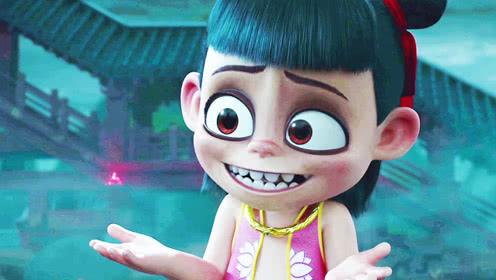"Then people brought little children to Jesus for him to place his hands on them and pray for them. But the disciples rebuked them. Jesus said, 'Let the little children come to me, and do not hinder them, for the kingdom of heaven belongs to such as these.' When he had placed his hands on them, he went on from there." (Matthew 19:13-15 NIV).
In the eyes of the disciples, praying for little children was meaningless because they are too ignorant to be up to any sort of mischief. However, that was not what the Lord Jesus thought. Instead, he was delighted to place his hands on them and pray for them. Then a teaching was given that "for the kingdom of heaven belongs to such as these".
This provides a striking demonstration of the Lord's emphasis on children. Jesus claimed that children's nature was an example adults should learn from and the positive role of education in children's life was recognized.
The popular Chinese animation "Nezha" has become exceptionally hot. Extensive discussions focusing on the hero Nezha are still ongoing.
Nezha is the son of Li Jing, the chief who governs Chentangguan, and Madam Yin. A holy pearl was supposed to be reincarnated into the boy, but by mistake, he is the reincarnation of an evil ball after his mother is pregnant with him for three years. He eventually becomes a bad boy commonly called "devil ball". Wherever he goes, whatever he does, he is not acknowledged, even when he wants to play shuttlecock with other children.
Labeled as a "bad kid" due to the "devil ball", Nezha gives up on himself for some time and kept saying that he would act like a demon. Since then, the boy became more badly-behaved; beating people and destroying goods were now common occurrences.
The film is based on a Chinese folk tale that has traditional roots. The plot reveals dualism between good and evil, reincarnation, the unity of yin and yang, all contradictory to Bible revelations. The holy pearl and devil ball are like the gods of fate; if one of the two is incarnated to a new body, it will determine that person's fate, possessing either an evil or good nature.
However, the Bible says that everything in the world is made by God, especially human beings, a masterpiece of God. The physical body and soul of a man comes from God. The doctrine that reincarnation decides a person's good or evil nature and his fate cannot hold its ground. That is fatalism.
The greatest struggle against fatalism in the movie is a word of Nezha: "My fate is decided by myself, not God." The "God" in this case does not refer to the true God, but the death that shrouds people's minds and binds their fates; a concept known as fatalism.
The turning point of Nezha's life starts from his disbelief in eccentric fatalism. Another factor resulting in his change is the love of his parents.
Favored by the citizens, Li Jing and Madam Yin, who are in charge of Chengtangguan, exert their utmost to fulfill their duties. The good couple were supposed to be rewarded. To urge the residents not to treat Nezha badly and in compensation for what her son causes the residents to lose, Yin works hard to eliminate monsters and do good deeds. To let his son have character conversion and be accepted, Li Jing is willing to lose face and dignity. He pleads with supernatural beings and kowtows to people to invite them to join his son's birthday party.
Not only as physical parents, the couple also play the role of spiritual mentors. More than once, Li says to Nezha that he is the only one deciding who he is. In a society where people are likely to be labeled, that reminder is food for the soul.
Encouraged by his parents, Nezha gradually changes and eventually gets rid of the "devilish" identity given to him by the devil ball. He yells out, "Others' comments on me are all bullshit. You are the only one deciding who are you. This is a lesson taught to me by my dad."
Today's society needs that kind of father who reasons with discipline while inspiring a child's perseverance and unyielding character. The Bible says, "Train a child in the way he should go, and when he is old he will not turn from it." (Proverbs 22:6). "The way he should go" is a call to parents to give their children biblical principles and help them develop their own nature.
The change of Nezha lies in his unyielding fighting spirit as well as his parents who support, accompany, and accept him while standing behind him from beginning to end.
- Translated by Karen Luo












